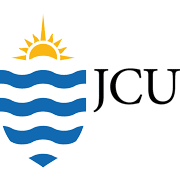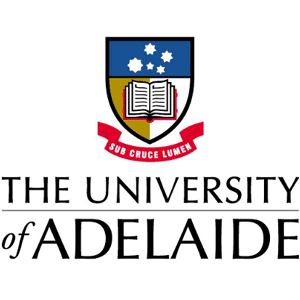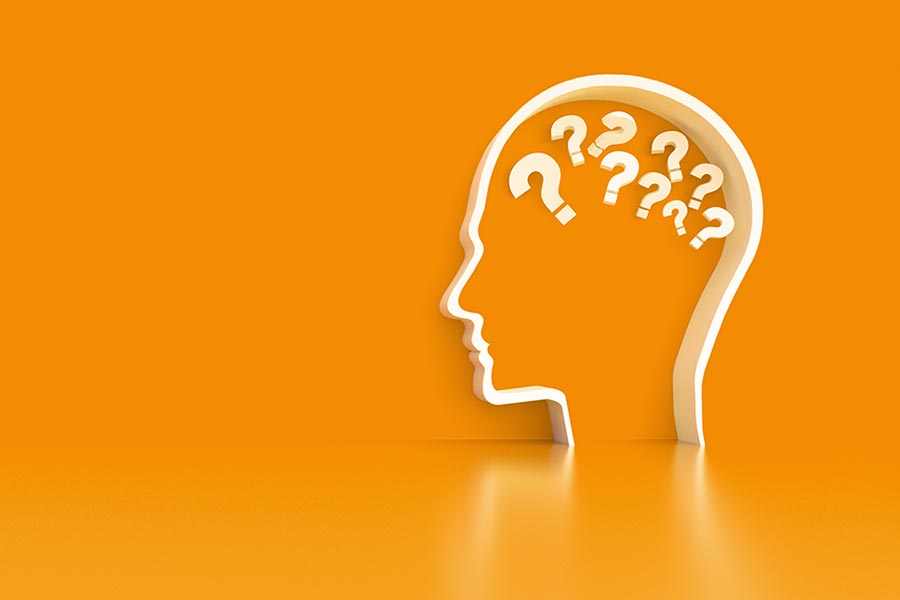Learn about the mind, human development, and psychological wellbeing in this open course.

Designed for university graduates who do not have a background in the field, the Graduate Diploma in Psychology is equivalent to a bachelor's degree. Delve into psychological science through 20 months of part-time study.
The objective of this qualification is to provide the same opportunities available in a traditional bachelor's program, but with an accelerated pace for university graduates. Explore psychological methods from a foundational level, so laying the groundwork for a career in psychology.
Course Overview
The online Graduate Diploma of Psychology is comprised of ten units. Participants learn how to use psychological science to analyse and promote wellbeing, explore human development stages from infancy to adolescence, and apply psychological theories to human growth as an adult.
The program paves the way towards becoming a practising psychologist, offering an opportunity to master fundamental psychological concepts. It provides a comprehensive overview of the theories and practices of psychology, making it ideal for those new to the subject.
For those aiming to become registered psychologists, this course is equivalent to an undergraduate degree with a major in psychology. This degree is also an excellent choice for students seeking a deeper understanding of psychology and to develop skills that can be applied in their current fields of study or work.
For students who have previously studied psychology at the bachelor level, you might want to consider the Graduate Diploma of Psychology (Advanced). This is a fourth-year, honours-equivalent qualification.
What You Can Do With This Qualification
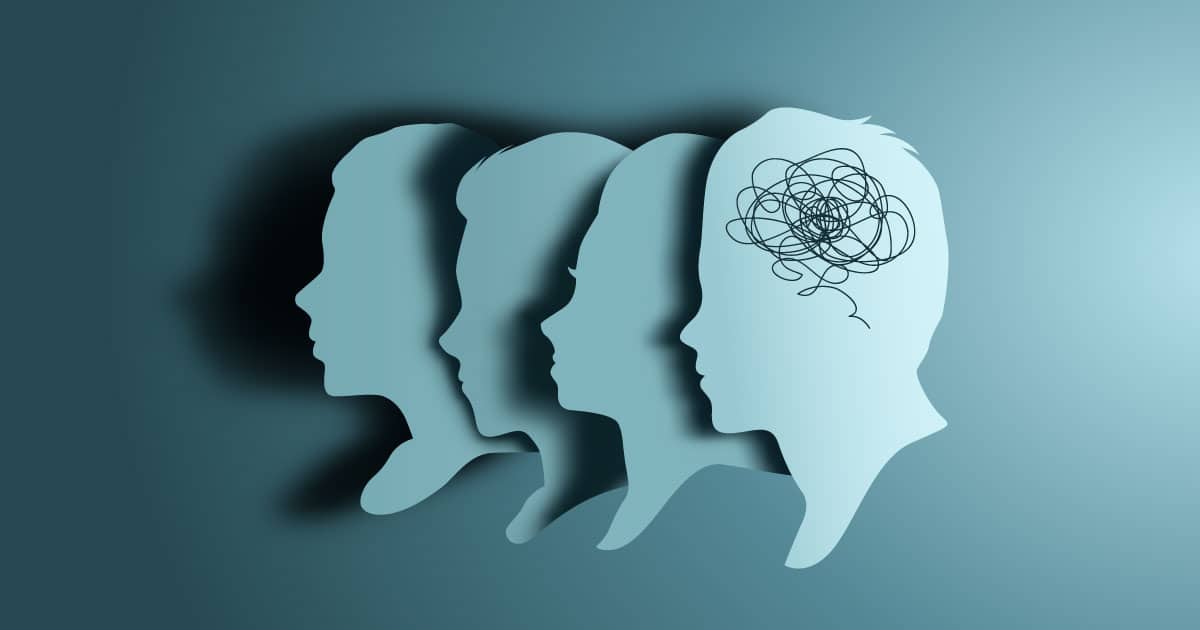
The Graduate Diploma in Psychology provides the same job and further education opportunities you would receive from a Bachelor of Psychology degree. Additionally, you might be able to leverage your previous degree and any work experience to your advantage.
Psychology is an intriguing discipline that excels at developing professional skills. You will become proficient in topics such as human cognition, learning, intelligence, individual development, abnormal psychology, and mental health conditions. Furthermore, you'll develop skills in research and report writing, life coaching, psychological assessment, statistical analysis and interpretation, and using psychology in workplace or social care settings.
This course is designed to serve as a potential foundation for a career as a practicing psychologist or psychology researcher. If you decide to continue your studies, you will be on a well-defined pathway to becoming a registered psychologist.
Immediate job opportunities after graduation include working in fields such as mental health support, case management, corporate communications, and program management. Each of these fields values the understanding of human behaviour, problem-solving skills, and effective communication capabilities that a psychology degree cultivates. Thus, embarking on this course puts you on track for a rewarding career.
Source: Jobs with a Psychology Degree in Australia
Best Online Courses in Australia

Australian universities offer a range of excellent online courses designed for flexible part-time study. These programs are perfect for working professionals, enabling you to fulfil other obligations alongside your studies. Subjects are completed sequentially, allowing you to concentrate on one topic at a time.
James Cook University
The Graduate Diploma of Psychology (Bridging) from James Cook University is an affordable and contemporary program from a psychology school that's been operating for over 50 years. The 10-subject APAC-accredited course can be completed 100% online over 20 months of part-time study. You do one subject from start to finish within each 7-week teaching period. You'll be kept up-to-date with recent developments in disciplines such as social and environmental psychology, counselling and neuroscience. Students also build skills in technology and the use of data, which are increasingly important for research and client and community care.
UTS Online
UTS Online's Graduate Diploma in Psychology is informed by the latest American Psychological Association (APA) Guidelines. These establish detailed aspirations for how psychologists should conduct themselves in applying psychological science. By completing this program, you'll gain insight into human behaviour, social and biological influences on the mind, and how to approach psychology as a researcher and practitioner. The flexible course from the UTS Graduate School of Health has been created just for online learning and serves as a pathway to becoming a registered psychologist.
Graduate Diploma of Psychology (Advanced)

A Graduate Diploma of Psychology (Advanced) is the next step in the sequence towards potentially becoming a registered psychologist and clinical psychologist. Just as a Graduate Diploma in Psychology is equivalent to a 3-year undergraduate degree, the advanced course corresponds with an honours (4th) year of bachelor studies. The advanced graduate diploma consists of coursework and research.
University of Adelaide
The Graduate Diploma in Psychology (Advanced) from the University of Adelaide is an online alternative to an on-campus honours year. The program takes 1.3 years of 100% online study and can be completed while you work full-time. Students benefit from state-of-the-art learning technology. Applied learning is emphasised, with regular exposure to real-world and simulated-real-world scenarios in case studies and assignments. Topics covered include data analysis using software, communication and interview skills, harnessing psychological evidence, measurement and assessment instruments, research planning and statistical analysis, and research projects.
UTS Online
Move a critical step forwards towards your dream psychology career with the Graduate Diploma in Psychology (Advanced) from UTS Online. Career readiness is one of the first subjects in this program and will provide you with a strong understanding of the professional opportunities in psychological science, along with practical skills to make you competitive in the job market. Students also develop their assessment, intervention and research skills. You'll have the opportunity to demonstrate and develop your research craft with two major projects that make up half the honours-equivalent course.
What You'll Study (Course Structure)
The Graduate Diploma in Psychology generally includes 10 subjects. While each program adheres to national standards, creating a level of uniformity, there's room for variation. You'll find core subjects like an introduction to psychology, research methods, human development, social psychology, and individual differences in most programs.
However, every university has its unique areas of emphasis. This allows you to pick a program that aligns more closely with your personal interests and career goals. But regardless of these distinctive focal points, all programs aim to provide a comprehensive understanding of psychology that will be valuable in a wide range of professional contexts.
Subject descriptions
James Cook University's program offers unique subjects such as environmental psychology & sustainable futures, neuroscience & biological bases of behaviour, and principles of counselling, thus delivering an extensive focus on environmental psychology, neuroscience, and counselling principles.
Environmental Psychology & Sustainable Futures
Students are introduced to the Environmental Psychology field and the role of psychology in developing sustainable futures. You'll examine the contribution of psychology to understanding and influencing human behaviour in relation to global sustainability challenges.
Human Development Across the Lifespan
This subject explores the human experience of life, with particular attention to physical, cognitive, and social-emotional changes during the life span. We examine the interplay of genes and environment; cognitive growth and decline; sensory perceptions; language and lifelong learning; and ageing and perspectives on death.
Individual Differences in Personality
Let's explore past and emerging theoretical approaches to personality. Students will also examine individual and cultural differences in how we conceptualise and measure personality in professional practice.
Learning, Memory Cognition and Language
This subject introduces the study of human information processing. We explore major theories and research on how information from the environment is accumulated, processed, retained, retrieved and used. Students consider how to apply research into learning, memory, cognition and language to global challenges, including ageing populations and our increased technological reliance.
Neuroscience & Biological Bases of Behaviour
Students are introduced to theories and concepts concerning the biological origins of behaviour. Topics include nervous system structure and function, how information is transmitted within the nervous system, roles of biological factors in cognition and behaviour; and anatomy and physiology of sensory systems.
Principles of Counselling
The theory and practice of counselling in a multicultural society are introduced to students. You'll explore how to work with diverse clients, accounting for the influence of personal beliefs and values. Students will learn counselling theories and methods and contemplate how therapeutic perspectives may influence your counselling style and practice. You'll also consider legal and ethical issues in a therapeutic setting.
Psychological Disorders and Interventions
This subject introduces empirical approaches to understanding maladaptive thoughts and behaviour, psychosocial disorders, and dysfunction. You'll explore evidence-based assessment and interventions for psychological dysfunction.
Psychology of Health, Wellbeing and Resilience
The field of health psychology is introduced. You'll investigate global health issues, chronic disease and biopsychosocial contributors to health, wellbeing and resilience. Students also consider the roles of motivation and emotion in shaping health and wellbeing.
Research and Statistics for Psychology
This subject explores research design and methods and commonly-used statistical techniques in psychology research and practice. You'll be introduced to the research process; from identifying a research question, planning research and choosing an analysis approach to interpreting data and disseminating results. Students apply their knowledge to case scenarios.
Social Psychology
Students are given an historical overview of group psychology, introducing them to theories and research methods used to explain and predict human thoughts, feelings and social behaviour. You'll examine concepts such as social perception, influence and relations, and examine individual and cultural differences in social cognition. We highlight the applied nature of group psychology with reference to health and wellbeing, human relations and sustainability.
The University of Adelaide's program places an emphasis on culture and context, individual differences and assessment, and applying research techniques.
Applying Research Methods in Psychology
This subject explores how to apply methodological and statistical concepts to real-world problems. You will: learn how to critically think about the research process, apply knowledge of research techniques to different cases, and refine your understanding of common analyses.
Culture and Context
Are your thoughts and behaviours mostly attributable to your environment? In this psychology course, we'll investigate the influences of cultural values and assumptions. Working with indigenous people is one of the contextual considerations. Students will examine how psychology can be used to improve work practices and job satisfaction and performance.
Developmental Psychology
What is individual development and does it plateau? In what ways do people evolve or stay the same as they age? In this online course, you'll build a multidimensional understanding of ageing and human development. Students will consider established and emerging theories, along with contemporary psychological research. You'll apply your new knowledge to both child and adult development.
Foundations of Psychology
This subject imparts foundational knowledge in psychological science. You'll learn about research, theories, concepts and uses of psychological science. Topics briefly covered include: biological bases of behaviour, child development, memory and cognition, mental health, motivation and emotion, and personality and ability.
Individual Difference and Assessment
While we're all genetically similar, do our thoughts and behaviours generally align or diverge? This online psychology course explores why people grow to be different. You'll examine theories, research methods and findings on understanding behaviour. Furthermore, you'll learn how to translate psychological theory into practice in the areas of personality, intelligence, and individual assessment.
Learning and Behaviour
How do beings learn from and adapt to their environment? This subject explores theories of learning and how research supports them, with applications to animal and human behaviours.
Perception and Cognition
In this subject, we explore the psychological science involved in perception, thinking and learning. You'll examine theories and principles based on cognition research and consider how such knowledge applies to real-world problems.
Psychological Health and Well-Being
What does it mean to be psychologically healthy? This subject introduces evidence-based assessment, prevention and treatment. You'll develop a holistic view of behaviours and experiences from the biopsychosocial perspective. Students also learn to identify how psychological health can be improved or is compromised.
Research Methods, Design and Analysis
How do we actually make well-founded discoveries about the mind and human actions? In this course, we'll examine research design, techniques and tools. You'll build skills to critically evaluate and do research into why people think and act in given ways.
Social Psychology
People have often been observed to behave very differently in groups than when isolated. This online course explores important topics in contemporary group psychology research.
UTS Online's program distinguishes itself by focusing on subjects such as cognitive psychology, psychological assessment, ethics, and professional skills, and society, psychological health and wellbeing.
Introduction to Psychology Foundations
Psychology is about understanding human behaviour and cognitive processes. This subject is one of a two-subject introduction to psychological science that builds foundational skills in academic writing and critical thinking. You'll examine psychological theories across major subfields and how mental and physical health impacts on individuals and society. Students also explore how perceptions of experience are affected by development and social and personality factors. The insights help us better understand behaviour and individual differences.
Introduction to Psychological Science
Complementing 'Introduction to Psychology Foundations', this subject further introduces psychological science. You'll review the history and philosophy of psychology, looking at some of the principles that underly the scientific approach to the study of the mind and behaviour.
Brain and Behaviour
In this subject, you'll learn about neuroanatomy and brain structure and functions, as well as neurobiology and how the brain operates at molecular and cellular levels. Students build understanding of learning principles and the neuroscientific bases of behaviour. You'll also review clinical case studies and experiment with behaviour modification techniques.
Cognitive Psychology
Humans make irrational decisions, our memory is malleable, and we perceive our surroundings without conscious awareness. How do these things happen? Let's find out by exploring relevant theories and empirical studies. We'll explore how biases create an imperfect lens for perceiving our experiences of the world.
Development Across the Lifespan
This subjects builds your understanding of psychological development across our lifespan, from infancy and childhood to adolescence, adulthood and older age. The human brain and mind is always changing under biological, social and cultural pressures. Students explore developmental disorders, along with healthy ageing and cognitive decline.
Psychological Disorders and Interventions
Students evaluate models of how disorders develop and are classified, diagnosed and treated. You'll also explore how socio-cultural factors and scientific developments shaped the dominant models of understanding and professional practice. Finally, students apply knowledge and critical thinking skills to example cases.
Research Methods and Theory in Psychology
You'll explore the scientific method that underpins the scientist-practitioner model. By comparing research techniques and designs, students will learn how the scientific approach differs from pseudoscience. You'll also consider questions, principles and ethics that guide scientist-practitioner work.
Research Design and Analysis in Psychology
Psychological science uses empirical evidence and continually adapts as new data become available. This subject will develop your skills in research design, data analysis and data visualisation. Students use freely available, intuitive software. Part of the course involves working on professional skills in teamwork and the critical interpretation of research findings.
Psychological Assessment, Ethics, and Professional Skills
The skills developed in this subject provide a grounding for the professional skills required by students pursuing an applied psychology career. You'll gain hands-on experience in administering, scoring and interpreting evaluation tools, developing your appreciation of the importance of applying valid, reliable assessment tools in practice and research. You'll also examine the Code of Ethics that governs psychological work, helping you to navigate certain ethical dilemmas.
Society, Psychological Health and Wellbeing
In this subject, you'll develop a greater understanding of how: (a) human life is profoundly influenced by connections to others and to our context and (b) psychological knowledge allows us to alter our context, lives and communities. Students critically evaluate the effects of social connections and context on health and wellbeing. You'll also explore strategies to prevent or resolve interpersonal or cultural conflict, and promote health and wellbeing.
Learning Outcomes
As a foundational or bridging course, a GradDipPsych provides a broad spectrum of knowledge across key areas in the field. This encompasses subjects like lifespan psychology, personality and social psychology, as well as abnormal psychology.
Graduates will also gain an appreciation for ethics in psychological practice and acquire the skill to apply a psychologist's perspective to problem-solving. Here are some more specific learning outcomes you can expect:
- Apply diagnostic criteria to psychological disorders using the DSM-5.
- Explain how psychological intervention strategies can be used in various contexts.
- Source, analyse, and present findings from cognitive psychology research.
- Generate solutions to research questions using data.
- Understand biological psychology and mechanisms of the nervous system.
- Apply key theories of social psychology to significant societal challenges.
- Demonstrate knowledge of various counselling approaches and methods.
Career Opportunities

With a bachelor's degree in one discipline plus the equivalent of a psychology degree, you're highly qualified to pursue many different careers. Not counting opportunities that might come from further study, psychology training is especially useful in the following occupations.
Case manager
A psychology qualification and some field experience sets you up to work as a case manager. You can work in sectors such as youth support, aged care, victim support, alcohol and drug rehabilitation, child and family, and migrant support.
Communications specialist
Psychology study positions you to work in communications by developing writing, verbal communication, messaging, active listening, interviewing and research skills. Jobs include community liaison officer and public relations officer.
Human resources manager
With excellent communication and organisational skills, coupled with strong interpersonal skills, a career in human resource management beckons. Job examples are HR assistant, HR officer, and human resources manager.
Public administration
Many jobs in the public service require the same general set of skills you gain by studying psychology, including research and report writing, communication skills, and statistical analysis. Look for graduate programs to get started.
Entry Requirements and Fees
Entry requirements for a Graduate Diploma in Psychology online course are essentially that you have a bachelor degree or equivalent or higher qualification. Your undergraduate degree should be in a discipline other than Psychology.
English language proficiency requirements also apply if you are from a non-English speaking country. Program participants must be proficient at listening, speaking, reading and writing in English.
Tuition fees are in the range of $3,400 - $3,852 in 2023 depending on the program. For a full 10-subject program, courses fees are 10x the per-subject cost. Australian citizens are eligible for a FEE-HELP loan.
How to Become a Psychologist
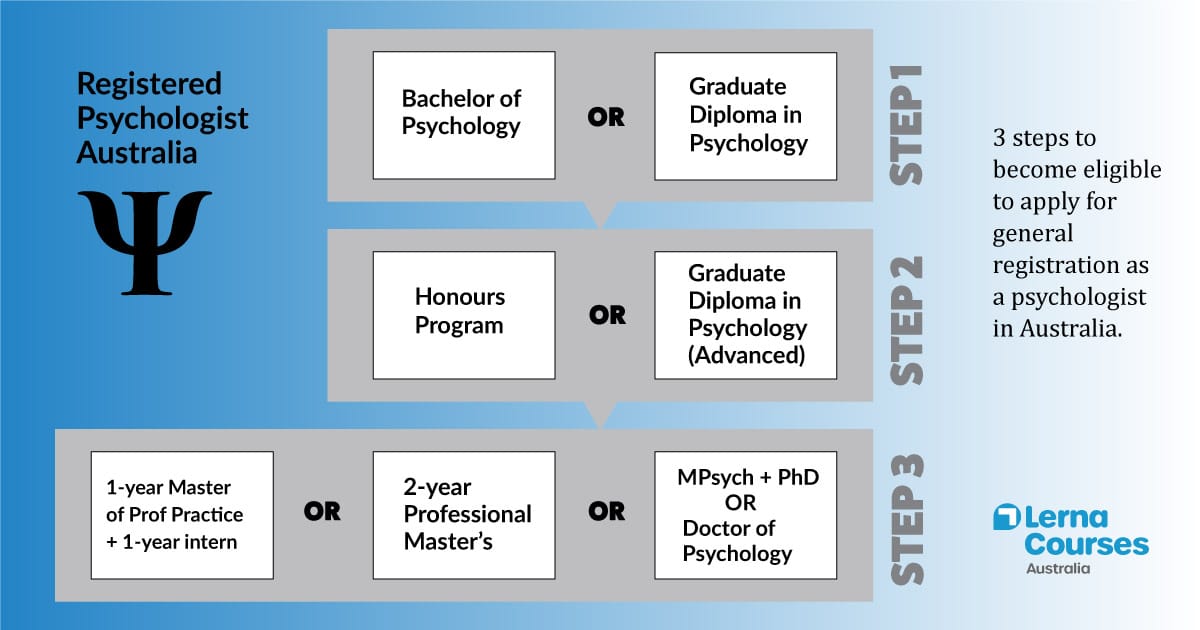
To become a registered psychologist in Australia, you need to complete a defined sequence of study and training. The sequence essentially has three steps. Further specialist training may also be needed to become a clinical psychologist.
Step 1: Bachelor of Psychology OR Graduate Diploma of Psychology
If you have a bachelor degree in a non-Psychology field, your first step is a Graduate Diploma in Psychology (GDP).
Step 2: Honours year OR Graduate Diploma in Psychology (Advanced)
Having successfully completed Step 1 with good grades, you're eligible for the second step: "fourth year" psychology with honours. This could be an on-campus honours program. Alternatively, you can do an online Graduate Diploma in Psychology (Advanced) (GDPA).
Related: 4th Year Psychology Online Courses
Step 3: Two or more years of postgraduate education and training
Before you can apply for general registration as a psychologist in Australia, you need further education and training. Options include a one-year Master of Professional Psychology (MPsych) followed by one-year of supervised practice OR a two-year MPsych program that includes work placements OR a doctoral program of either: (i) a combined MPsych and PhD or (ii) a professional doctorate (DPsych).

